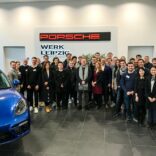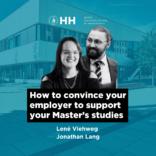Germany’s Top-Level Executive and Porsche AG CFO Lutz Meschke on Leadership Skills and Career Management
Interview with Lutz Meschke, Deputy Chairman and Member of the Executive Board Finance and IT at Porsche AG
Member of the Executive Board Investment Management at Porsche Automobil Holding SE
This interview was first published in November 2020.
On January 1, 2021, Lutz Meschke, Deputy Chairman of the Executive Board and Member of the Executive Board, responsible for Finance and IT, at Porsche AG as well as Member of the Board of Management, responsible for Investment Management, at Porsche Automobil Holding SE, will be appointed as the new Chairman of HHL’s Supervisory Board. He follows in the footsteps of Dr. Tessen von Heydebreck who has led the school’s Supervisory Board since 2009.
As an executive, I have to be able to motivate, moderate and integrate as well as act with empathy.
Germany’s top-level executive on leadership skills and career management
Porsche CFO Lutz Meschke is responsible for IT and finance at the globally operative sports car manufacturer. He is one of the key players when it comes to future challenges far beyond the production line. In this interview, we speak to him about his professional journey as one of Germany’s top-level executives and why leadership needs a paradigm shift. Lutz Meschke explains his future impact on HHL and why luck has been a relevant factor in his professional life.
At Porsche, you are responsible for digitalization and innovation. That means your field of activity corresponds with the core topics of research and study at HHL. Do you think that HHL students will recognize your personal signature in their everyday lives?
Of course, I have taken on this position intending to create a positive development. I am thrilled to bring my experience from the economy into academia. I can already give you a specific example. Many companies, Porsche being one of them, have a significant demand for on-the-job training for their employees. Porsche and HHL want to address this need with a new training format.
Leadership is currently undergoing a paradigm shift in light of globalization, digitalization and increased mobility. How would you define successful leadership today and what are the implications for future executives?
Modeling leadership in a hierarchical way has had its day. Of course, you need specialist knowledge, but you also need to bring people along on the journey. What does transformation mean? Which tools do I use?
As an executive, I have to be able to motivate, moderate and integrate as well as act with empathy. A good leader builds a strong team by finding the ideal mix of various skills and characters: so the team works independently and is able to develop new products and processes.
Prof. Dr. Stephan Stubner, Dean of HHL, says about Lutz Meschke: “With his professional background and conceptual orientation towards the topics of the future, Lutz Meschke will be able to provide new impetus for HHL in his position as Chairman of the Supervisory Board. I have known him to be a discerning conversation partner who has a clear understanding of what direction universities need to go to create value on a long-term basis and remain relevant in research and instruction.”
Do you want to read more articles like this one? Check out these afterward!
You have been with Porsche AG for 19 years now and previously worked for the consulting firm KPMG. Your career path towards becoming one of Germany’s top-level executives is remarkable. How did you transition your focus from consulting to the industry?
I started my career as an auditor in the 1990s. The auditing jobs quickly started to include consulting tasks as well. Back then, those two topics were not as strictly separated as they are today. After the fall of the Berlin Wall, for example, I helped to build the controlling department of the Treuhand-Anstalt in Leipzig. This was the agency established by the government of the German Democratic Republic to reprivatize or privatize East German enterprises.
As a consequence, I was relatively quickly involved in creating solutions. I soon realized that this kind of work suits me much better than just reviewing numbers. So, my moving into the industry was only a question of time. Therefore, in 1999, I decided to accept the position as Head of Group Consolidation and Controlling at Hugo Boss. Two years later, Porsche offered me the position as Head of Accounting.
“What I find extremely important is to always show your personality, not put on an act, stand up for what you believe in even if things get tense sometimes.”
What strategies did you use to actively influence your career?
I sometimes find it bizarre when people speak of a clear career strategy. In addition to skill, a lot depends on luck as well. You have to be in the right place at the right time and you need a mentor to support you. Many things cannot be planned. What I find extremely important is to always show your personality, not put on an act, and stand up for what you believe in even if things get tense sometimes. Then someone will eventually notice that you are a personality who can also hold fast in a storm. And once a position opens, people will think of you relatively quickly. That was how my career path developed.
It is like in sports — you can have eleven top-level soccer players but if they do not harmonize, the team will not be successful. It is important to have a well-balanced team that also fits together on a personal level and has a leader who holds everything together and scores a penalty in the 95th minute when push comes to shove.
Photo credit header: Christoph Bauer, Porsche AG





